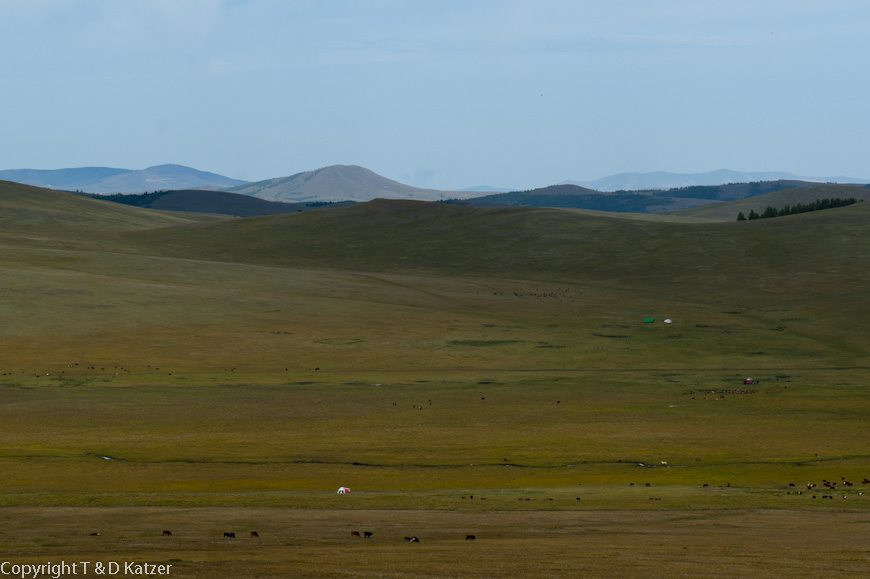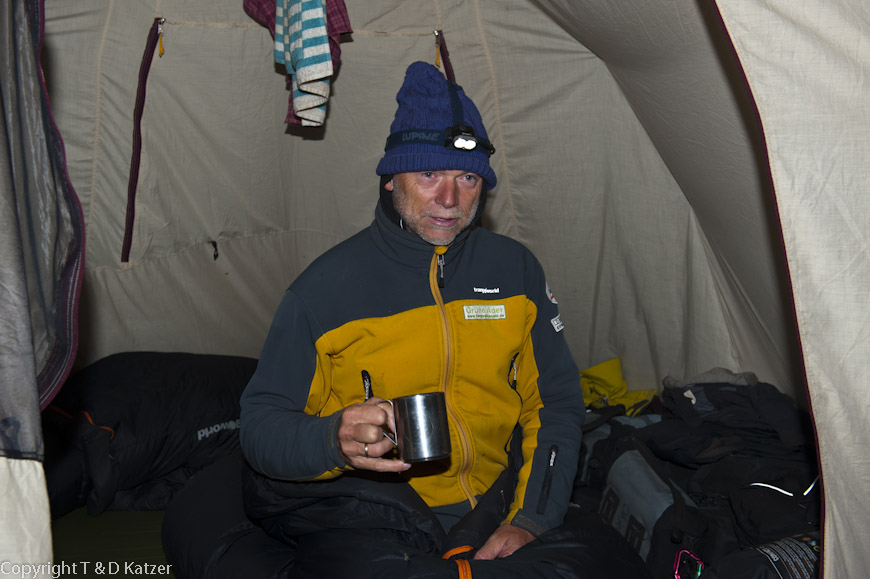
Glowing eyes
N 48°55'433'' E 103°39'440''
Day: 407
Sunrise:
06:25
Sunset:
19:44
Total kilometers:
2468
Soil condition:
Grass
Temperature – Day (maximum):
23 °C
Temperature – day (minimum):
18 °C
Temperature – Night:
minus 4 °C
Latitude:
48°55’433”
Longitude:
103°39’440”
Maximum height:
1380 m above sea level



“Woof! Woof! Woof!”, Mogi barks into the darkness. “What’s going on?” I ask, sitting up and looking out of my sleeping bag. Countless glowing dots reflect the beam of my headlamp. A large herd of horses surrounds Naraa, Tuya, Tenger, Sharga, Bor and Sar. “Get off!” I shout, because the stallions still want to mount Naraa. The horses ignore me, so I stand up and run towards them, shouting loudly. The many hooves gallop quickly into the darkness. Satisfied, I crawl back into my sleeping bag. As soon as I have made myself comfortable, Mogi strikes again. “What is it now?” Once again, our horses are surrounded by a herd of horses. This time a different, somewhat smaller herd. “Leave us in peace!” I grumble, storming out of the sleeping shell. An hour later, a large number of pairs of eyes are still glowing in the darkness. If I didn’t know that there were horses and bark behind it, this glow could scare you. For me, however, the nocturnal eye glow has become a familiar sight.
Weary of the constant disturbance, I leave my warm sleeping shell for the umpteenth time to sneak up on the animals this time. Because the wind is favorable, the grass-eaters don’t notice me. Only when I’m about 10 meters from the horses do I switch on my headlamp and chase towards the four-legged friends, shouting loudly. The new tactic hits like a bomb. The horses race off in a wild stampede and don’t show their faces for the rest of the night because of the terrible fright I have given them.
In the morning, I dry the condensation from the tent canvas as it thaws in the sun, untie the horses from the pegs and boil water. When Tanja wakes up, there is already hot water for tea in the thermos flask. “Oh, I’m so tired,” she yawns in the morning. “No wonder, the constant tension is slowly falling away. Our bodies know that this long and extreme journey will soon be over,” I say. “So, how was your shift?” “Nasty. I was constantly forced to get up by herds of horses. But in the end I scared them so much with my new sneaking trick that they stopped coming. They probably thought I was a horrible monster who likes nothing better than eating horses,” I say, explaining my actions. “Ha, ha, ha, a good idea. It’s a shame that you only had this epiphany at the end of our journey.”
After breakfast – fresh grain porridge and Mongolian cookies for a change – Tanja heads into the mountains to reach Bilgee. Meanwhile, I start packing. When Tanja is back in camp, it turns out why Bilgee didn’t show up last night. “His shaman forbade him to travel. It was an unthinkably bad time to go to the countryside. Even today he is not supposed to leave his home until 12:00 noon. When I told him you were already busy dismantling the camp, he asked me to wait for him,” Tanja reports. “A bad travel day?” I reply. “Yeah, didn’t sound like that was an excuse.” “Okay, then we’ll wait for him. It’ll be too late to leave then, though. But one day or another doesn’t matter,” I say and drag the already packed duffel bags back into the tent.
While we wait for Bilgee, a small truck rattles past. Boldoo, Bilgee’s friend, gets out and asks us to wait for Bilgee too. “He’ll be there in half an hour,” he is convinced. Apparently Bilgee is really worried that we might leave without waiting for him,” says Tanja. “Looks like it. He will remember Mörön. We didn’t take kindly to his delay there, which ultimately led to us riding on without him,” I ponder.
We talk to Boldoo for a while longer. “That’s unbelievable. I can talk to you,” he says in amazement. “But yes,” answers Tanja. “Well, last year you couldn’t speak a word and now you can communicate. Fantastic, you’ve learned a lot,” he praises us with a laugh. Then he gets into his truck in a good mood and drives off. As soon as the noise of the engine is swallowed up by the mooing of the cows, a rider appears with his young son. He sits down in the awning. Tanja hands him sweets and a cup of tea. “I hear you want to sell your horses?” he asks. “Yes,” I answer and wonder how the drums of the steppe work. “I’ll pay 400,000 Tugrik for the mare and foal. (242,- €) “We won’t sell her for less than 450,000 Tugrik (272,- €). But we’ll consider your offer,” I reply, whereupon he and his ten-year-old boy get back on their horses and gallop off. “Is 400,000 tugrik a fair price?” I ask. “Since Shuree offered the same amount, you could assume that,” Tanja replies. “If we offer our boys below the market price, they will certainly be bought. Perhaps we should offer our horses to Shuree and her husband for a total price of 1.8 million Tugrik (1090,-€). That would be 360,000 Tugrik (218,- €) per horse. They can’t refuse this offer and the small herd will stay together?” I ponder. “You’re probably right. I’ll text her. But maybe Bilgee really does take care of the horse sale. He certainly knows a lot of people in this valley.”
A little later, Bilgee appears with Tzolaa, the daughter of one of his five sisters. They bring us two tins of fish, two bags of Mongolian cookies, bread and sausage. “Because our food supplies are almost exhausted, we are very happy. “What do you get for it?” I ask. “Nothing,” they both answer as if from the same mouth. In the course of the conversation, it turns out that Bilgee actually wants to take care of the sale of the horses. “You shouldn’t ride any further. This is a good place to end the expedition. We can certainly get 500,000 Tugrik (303,- ) per horse. It won’t take too long and we’ll have sold them. If we need food, we’ll call one of my relatives in Erdenet. They will bring it to us immediately, so we won’t have a problem with food supplies if necessary,” Bilgee suggests. “We? Does that mean you’re staying with us?” I ask. “But yes. Otherwise I can’t help you with the sale. I’ll also help you look after the horses at night. You must be tired and need a rest.” “Yes, we need it urgently,” I reply, delighted at his offer. “You were quick?” “19 days including the rest camps. But we only needed ten days of riding,” I reply. “An average of 40 kilometers a day. A great performance with all the luggage,” praises Bilgee. “No problem without a horse-drawn cart. We actually wanted to take more time, but the thermometer has dropped to eight degrees below zero in the past few nights. Didn’t fancy the onset of winter.” “I can understand that. Well, what do you think about one of you going into town with Tzolaa to buy groceries?” “Is Tzolaa going back out here afterwards?” asks Tanja. “But yes.” “Oh, wonderful. I’ll go then. Denis, you can set up the tent again in the meantime,” she suggests. “You should see a doctor about your foot. It really doesn’t look good.” “A doctor can’t help me now,” Tanja replies, ignoring Bilgee’s suggestion. A few minutes later, Tzolaa’s little car leaves our camp.
While I use the time to set up the tent again and write a little, Bilgee builds a frame for our water bag. As always, he is very eager and hard-working. Interestingly, he is not the least bit offended that we only offered him 5,000 Tugrik (€3) per day plus food for him and his children instead of 10,000 Tugrik (€6) in Mörön. This was the real reason why he didn’t come. His decision was very important for our trip, his absence showed us that we could manage well without outside help. On the contrary, we enjoyed being alone to the full.
Three hours later, Tanja is back in camp. “You should never go shopping hungry,” she says, carrying 180,000 tugrik (€109) worth of food into the tent. “Like you were starving,” I shake my head. “I was too. The same thing day in, day out.” “I have to agree with you, though. Did you also buy beer and nuts?” “How could I forget that.” “Wonderful. Then we’ll celebrate our successful arrival today?” “We should. Since Bilgee thinks this valley is ideal for selling our horses, we won’t be moving on. That means this is our arrival camp,” says Tanja. “We left here a year ago,” recalls Bilgee. “A year and a day ago to be precise,” I reply. “It was a very eventful year. We’ve experienced a lot,” says Bilgee thoughtfully. Tanja, meanwhile, arranges various types of Mongolian cookies, bread, pickled cucumbers, coffee, milk, sweets, chocolate, meat, noodles, etc. on a sheet of foil on the floor. Just the sight of the various delicacies makes my mouth water.
We eat everything without restraint, drink beer and snack on peanuts. “It’s kind of strange to reach your destination so suddenly,” says Tanja. “Well, suddenly is an exaggeration,” I reply with a grin. “That’s right. Nevertheless, we thought we would need a day or two longer.” “We mustn’t forget the sale of the horses and the entire organization behind the expedition. Only when we have mastered this well will the journey be successfully completed for me,” I say. “True, but we did it. No one can deny that. Despite all the challenges and despite what many locals said, we managed to get our horses to the finish point safe and sound. That’s great, isn’t it?” “That’s right. It is great. Simply fantastic. If we can now find a good home for our horse family, I’ll be completely satisfied.”
Because today we are blessed with a cloudless starry sky, Tanja lies down in front of the tent with her sleeping mat. “I want to enjoy this view for as long as possible,” she says.
We look forward to your comments!

